My soft and springy chiffon cake recipe has a light, melt-in-your mouth crumb that’s delicate, but not so delicate that it falls apart. It requires a bit of technique, but nothing that you can’t handle if you read through the steps carefully (and check out my how-to video if you’re a visual learner!).
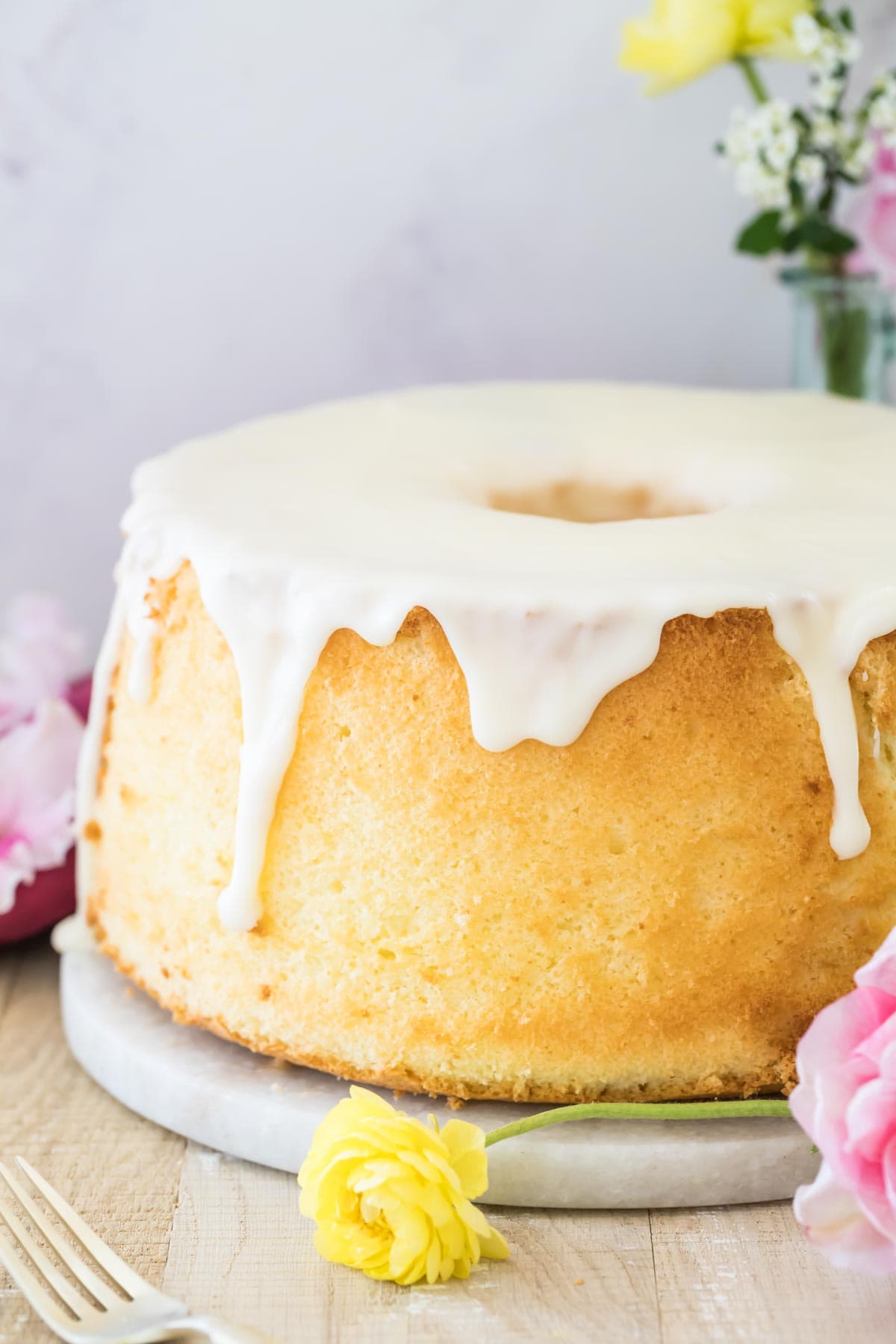
Have you ever tried a chiffon cake before?
This light and airy cake is slightly heavier than its sister, the angel food cake, thanks to the fact that it incorporates plenty of fat by way of oil and egg yolks (unheard of to the pristine, fat-free angel food cake). Its sponge is slightly heavier and more tender and richer, (it leans towards pound cake in the richness department), but still deliriously soft, springy, and melt-in your mouth.
You’ll dirty a few dishes on your way to this cake, but I guarantee that it’s 100% worth it. All good things come with a cost and a few extra bowls to wash is a small price to pay for chiffon cake. With its light texture and subtle sweetness, it’s the perfect freshly flavored cake for summer.
I put a citrus spin on my chiffon cake because I felt the bright flavor was the perfect summer-y compliment to such a fresh and light cake, but I’ve included alternatives if you’re not a fan of orange flavor (you should really give it a try, though!).
What You Need to Make Chiffon Cake
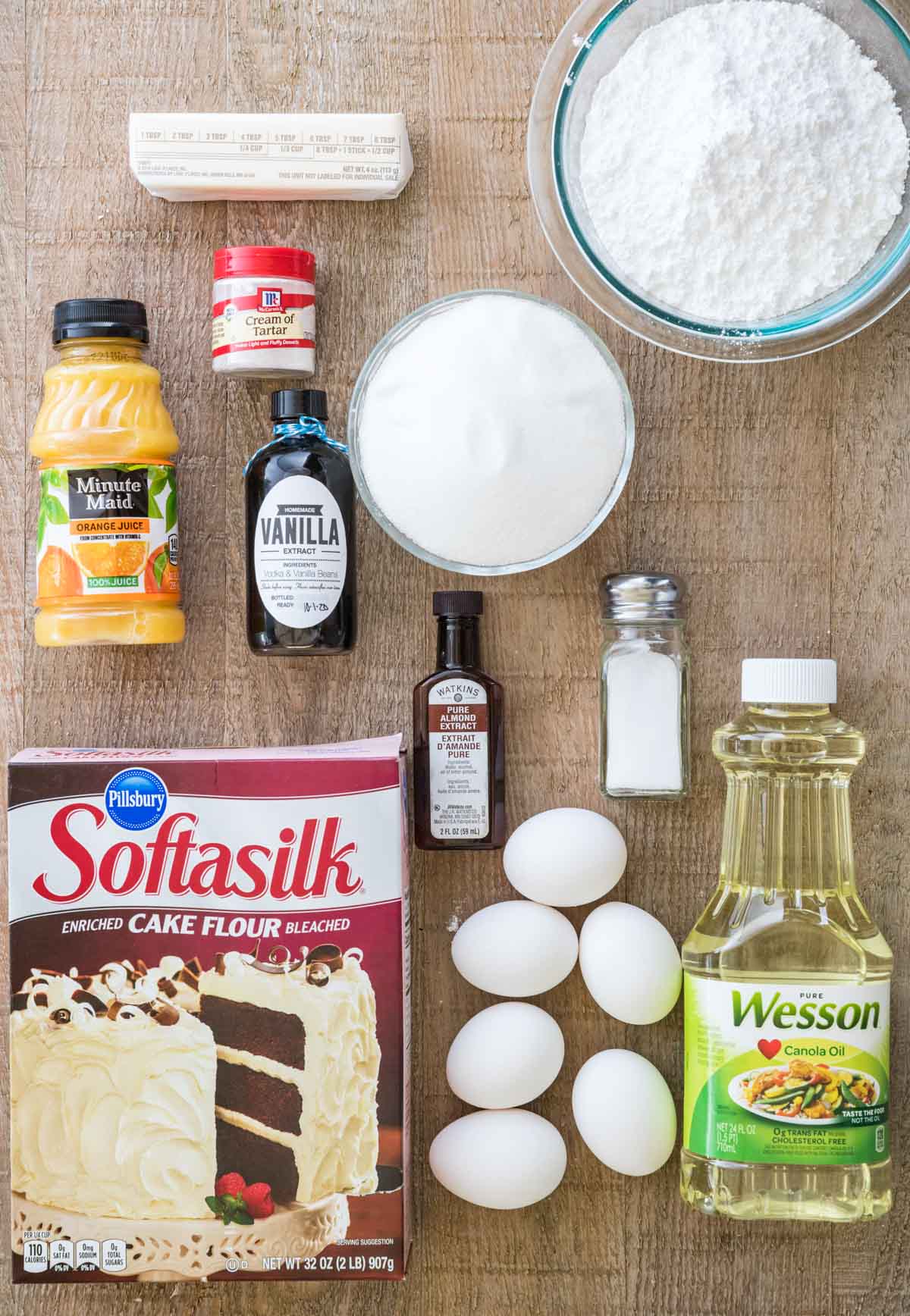
- Cake flour. Cake flour is lighter and finer than all-purpose flour, which typically lends itself to a light crumb. Here is no exception, and since this recipe is otherwise weighed down by the fats included in our ingredient list, I wanted to give the crumb the best chance of rising tall and staying delicate and light. Because of this, I prefer and recommend cake flour only for the best-textured cake.
- Sugar. Using granulated sugar only helps to keeps the cake light (the molasses in brown sugar would weigh it down, plus the flavors would clash with the citrus). The sugar is divided, and some will be reserved to be beaten into the egg whites to help give them stability and structure (which in turn will give the finished cake a tall, light structure).
- Baking powder. This leavener is important in combatting the heavier ingredients (like the oil) and giving us a light texture.
- Eggs. You must divide the egg yolks and egg whites, but we’ll be using both of them. The egg yolks are beaten into the batter, but the egg whites are beaten separately to stiff peaks and then gently folded into the cake batter to help make it light and delicate. If you’ve made my tres leches cake before, you’ll probably recognize this technique and will appreciate the stunning results it yields!
- Oil. If we spend so much time combatting the fat-containing ingredients in this recipe, maybe you’re wondering why we even include them in the first place. The answer is flavor and texture! The oil helps to coat every molecule of the cake, making it tender and melt-in-your-mouth. Any neutral oil (canola oil or vegetable oil) will work. I don’t recommend olive oil which has its own stronger, distinct flavor, and I also don’t recommend using butter, which contains water and will actually make your cake less moist.
- Orange juice (or other liquid!). I love using orange juice because it imparts a light, citrus flavor into the cake (nothing overwhelming, its very subtle but still present). If you’d rather not have the citrus infusion, water will work instead.
- Flavoring. Vanilla extract is a must. For a bright additional flavor, add a drop of almond extract as well!
- Cream of tartar. The role of cream of tartar is to help stabilize the egg whites, ensuring they reach stable stiff peaks and that the cake doesn’t collapse on itself. Cream of tartar is a white powder that can usually be found in the spice section of your grocery store.
If you’d like the same glaze that I used in the photos, you’ll also need butter, powdered sugar, and more orange juice (or milk). It’s based off my donut glaze and is rich and buttery, which I think is a nice contrast to the airy cake.
Remember, this is just an overview of the ingredients I used and why. For the full recipe please scroll down to the bottom of the post!
How To Make Chiffon Cake
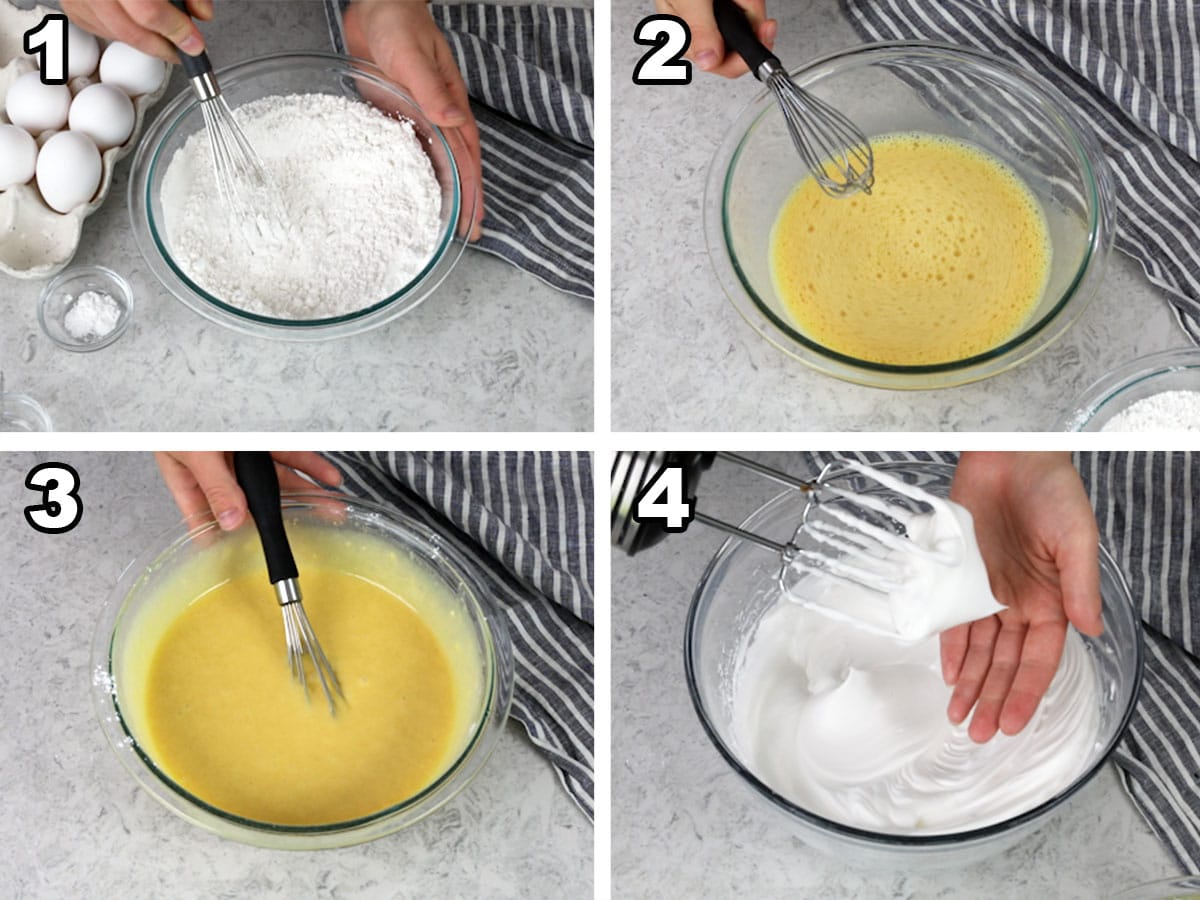
- Begin by whisking together cake flour, baking powder, salt, and some of the sugar (you’ll need to reserve ½ cup for stabilizing the egg whites).
- Separately, whisk together the egg yolks (yolks only! Save the whites in a separate large clean bowl), oil, extracts, and orange juice until the egg yolks are broken up and the mixture is smooth and well-combined.
- Combine the flour mixture and the egg yolk mixture and whisk until the two are well-combined.
- In the bowl with your egg whites(yes, you have to dirty several bowls for this recipe, but it’s worth it!) add a pinch of cream of tartar and begin to beat the mixture. Slowly add the sugar until you have thick, stiff peaks that hold their shape and don’t fold over or fold back in on themselves.
SAM’S TIP: Make sure that when you divide your egg whites and yolks, the whites are placed in a completely clean, dry, and grease-free bowl. For best results use a glass or metal bowl, a plastic/rubber one is not recommended. Also make sure that not even a tiny bit of yolk is mixed in with the egg whites. If these steps aren’t followed properly, the egg whites may never reach stiff peaks, no matter how much you whip them.
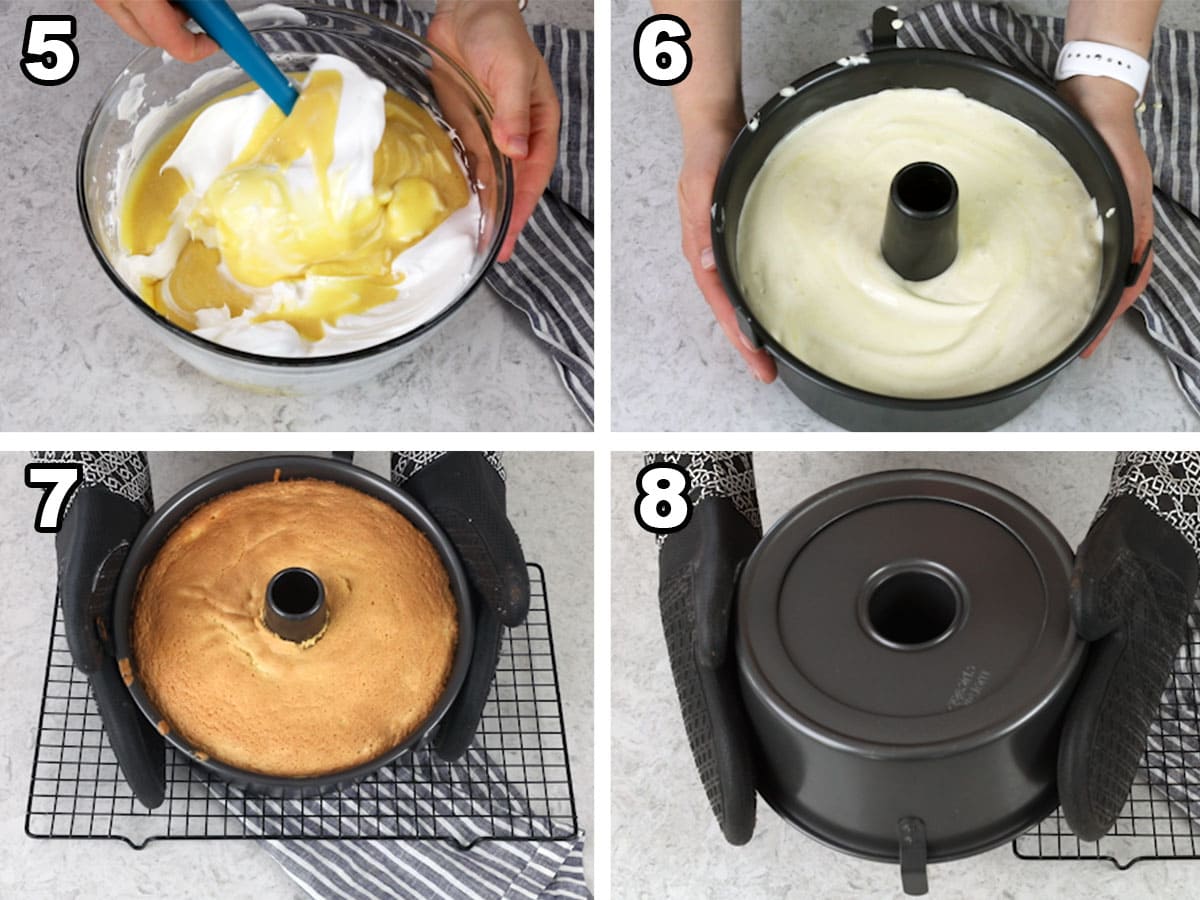
- Gently fold together the egg yolk mixture and the egg whites. You just spent all that time whipping air into your egg whites, so do this part gently to avoid deflating the whites as much as possible. Of course they’ll deflate some as you mix, but if you over-mix your cake could turn out dense or even fall in on itself.
- Spread into an ungreased tube pan.
- Bake until golden brown and any cracks in the surface appear dry. If you lightly touch the surface with your finger, it should spring back and not cave in.
- Carefully invert the cake onto a can or bottle and let it cool completely upside down. This is important for the cake to stay light and airy, if you cool it right-side-up it will shrink in on itself and become dense. A tube pan is important for chiffon cake so that you can invert it this way.
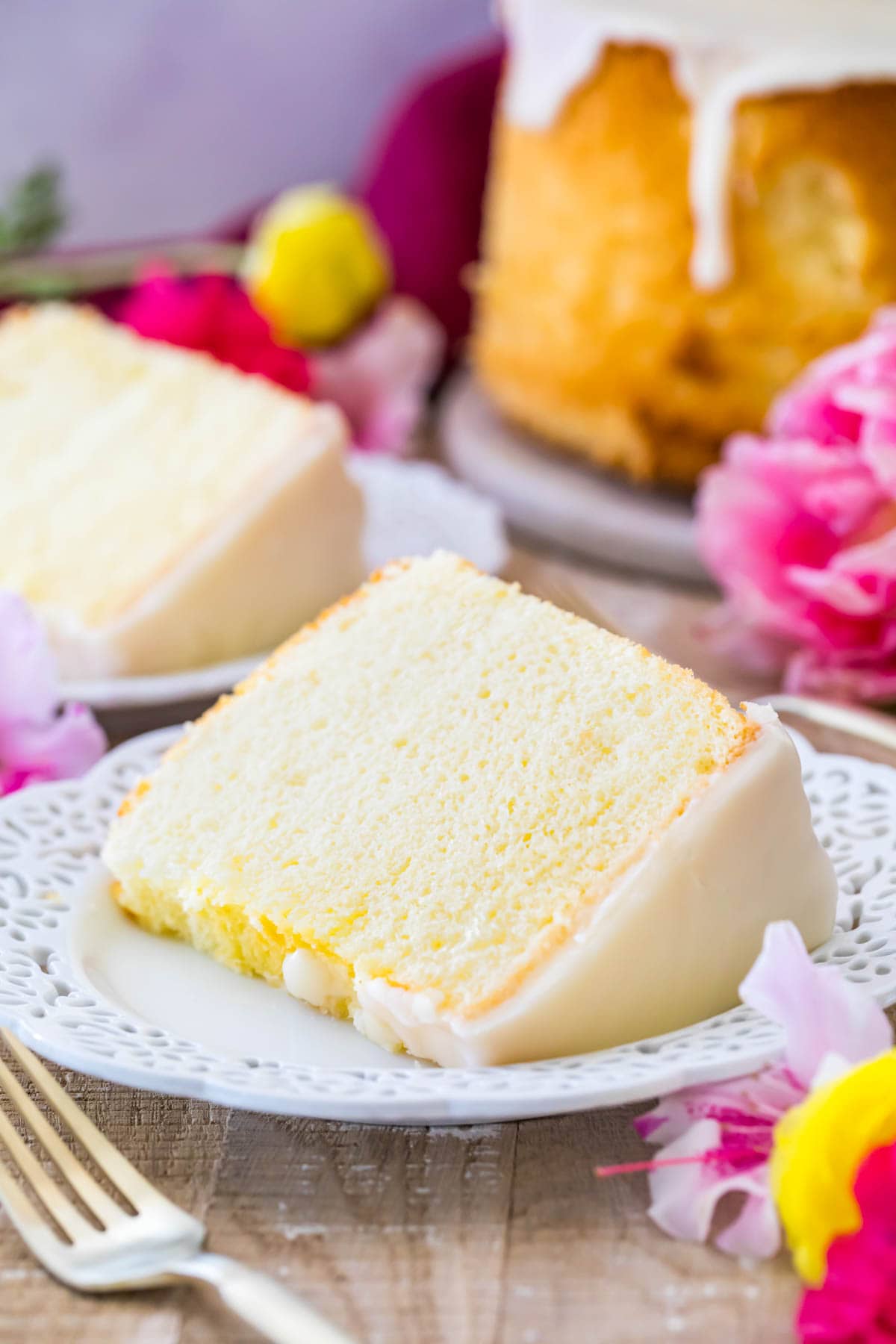
Frequently Asked Questions
If you greased your cake pan or if the cake was not fully baked, it could unfortunately fall out of the pan once it is inverted. I also counsel against using tube pans that have the prongs on the sides that are meant for inverting the pan without a can or bottle. Unfortunately, with some pans, these prongs will pull the sides of the pan away from the center once inverted, sometimes causing the cake to separate from the pan and fall out. Even if your pan has prongs, I still recommend inverting it on a can or bottle.
While a chiffon cake is more dense than an angel food cake, it shouldn’t be as dense as, say, a pound cake. If you find that yours is dense or dry, most likely this is due to either the egg whites not being whipped fully to stiff peaks or over-mixing the batter once you add the egg whites. If you deflate your egg whites, the cake is likely to turn out dense.
Unfortunately I do not recommend it. The tall tube pan allows the cake to rise properly and being able to invert it is critical to the lighter and airier crumb. If you use a regular cake pan or loaf pan, the cake cannot be properly inverted after baking and will shrink in on itself and is likely to turn out flat and dense. I’ve linked to the tube pan that I use in the “equipment” section of the recipe.
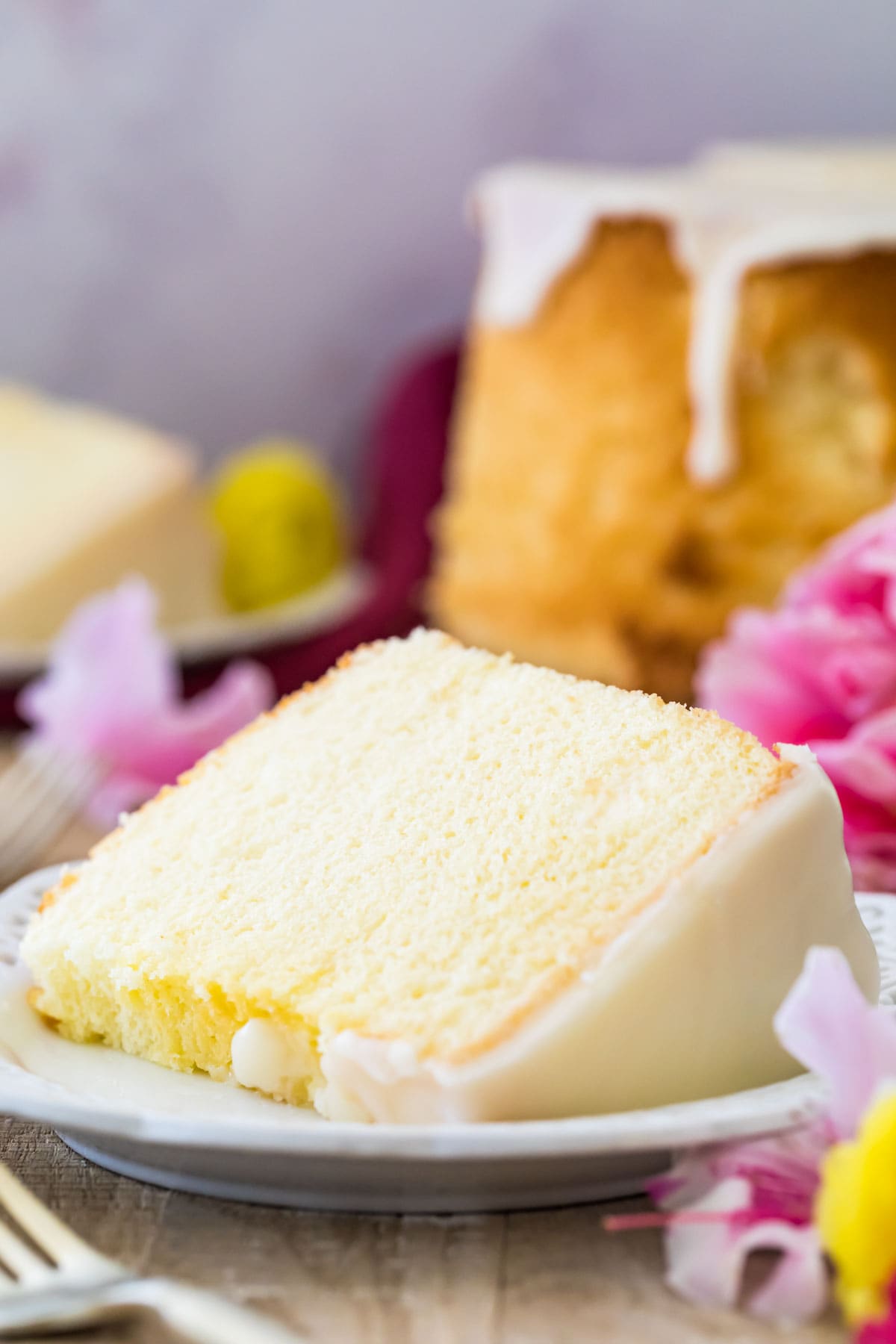
More Recipes You Might Like
Enjoy!
Let’s bake together! Make sure to check out the how-to VIDEO in the recipe card!
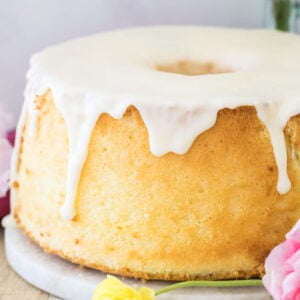
Chiffon Cake
Ingredients
Chiffon Cake
- 2 ¼ cups (250 g) cake flour
- 1 ¾ cups (350 g) granulated sugar divided
- 2 teaspoons baking powder
- 1 teaspoon salt
- 6 large eggs whites and yolks separated
- ½ cup (118 ml) canola oil
- 1 cup (236 ml) orange juice may substitute milk or water
- 2 teaspoons vanilla extract
- ¼ teaspoon almond extract optional
- ½ teaspoon cream of tartar
Glaze (optional)
- ½ cup (113 g) salted butter melted
- 2 ¼ cups (280 g) powdered sugar
- 2-4 Tablespoons orange juice or milk as needed
Recommended Equipment
Instructions
- Preheat oven to 325F (165C).
- In a large bowl, combine flour, 1 ¼ cups (250g) granulated sugar, baking powder, and salt and whisk together.2 ¼ cups (250 g) cake flour, 1 ¾ cups (350 g) granulated sugar, 2 teaspoons baking powder, 1 teaspoon salt
- In a separate bowl, combine egg yolks, canola oil, extracts and orange juice (or milk or water) and beat very well until mixture is smooth and well-combined.6 large eggs, ½ cup (118 ml) canola oil, 1 cup (236 ml) orange juice, 2 teaspoons vanilla extract, ¼ teaspoon almond extract
- Add the egg yolk mixture to the flour mixture and stir until mixture is thoroughly combined.
- In a separate large, clean, dry, and completely grease and moisture-free bowl, combine egg whites and cream of tartar. Use an electric mixer to beat on medium-speed until foamy. Gradually increase the mixer speed to medium-high and gradually add remaining ½ cup (100g) of granulated sugar, about 1 Tablespoon at a time, allowing about 10 seconds of mixing after each addition.½ teaspoon cream of tartar
- Increase mixer speed to high and beat until egg white mixture is thick and glossy and you have reached stiff peaks.
- Add the egg yolk mixture to the egg whites and use a spatula to carefully fold the ingredients together until batter is smooth and completely combined,
- Pour evenly into an ungreased tube pan. Transfer to the center rack of 325F (165C) oven and bake for 50-55 minutes and any cracks on the surface appear dry.
- Remove from the oven and immediately invert onto a can or bottle.
- Allow to cool completely before running a knife along the inside of the pan to release the cake from the pan and then turning it out onto a serving rack. If desired, top with glaze before serving.
Glaze
- Combine melted butter and powdered sugar in a large bowl. Whisk together until smooth. Mixture will be stiff, add orange juice (or milk) starting with 2 Tablespoons, and add more as needed until you have a smooth glaze that drizzles smoothly off the whisk.½ cup (113 g) salted butter, 2 ¼ cups (280 g) powdered sugar, 2-4 Tablespoons orange juice or milk
- Pour evenly over cooled cake. Allow glaze to set (about 30 minutes, though this can vary depending on the specific thickness of your glaze) before slicing and serving.
Notes
Storing
Store in an airtight container at room temperature for up to 4-5 days.Nutrition
Nutritional information is based on third-party calculations and should be considered an estimate only. Actual nutritional content will vary based upon brands used, measuring methods, cooking method, portion sizes, and more.


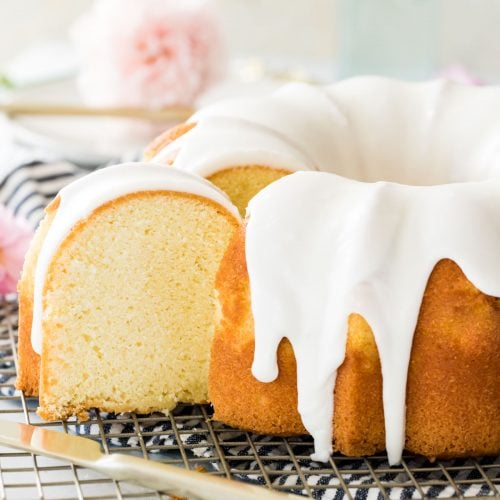
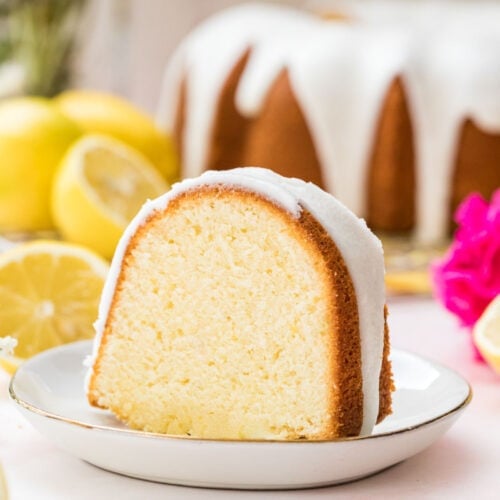
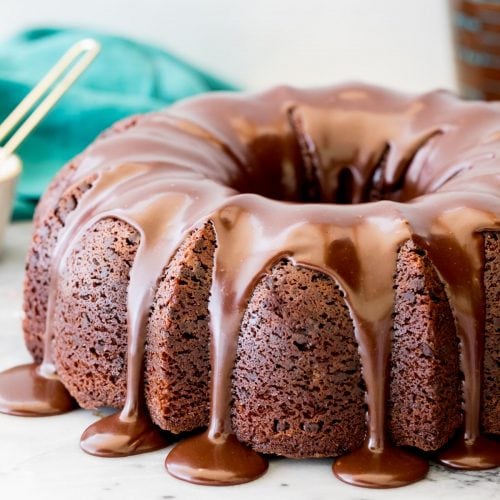
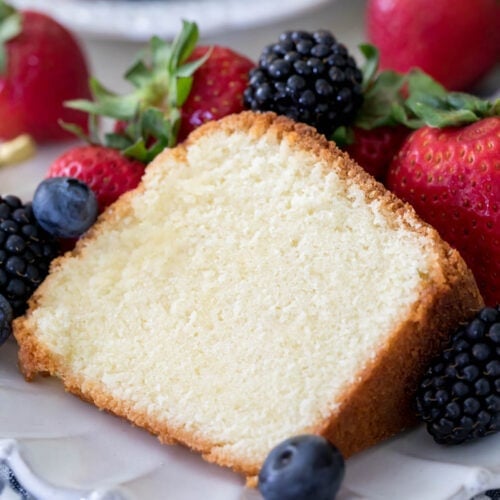
Deborah
Wow!!! It’s Father’s Day today and I made this cake. It’s divine. The almond extract and frosting take it to the next level. Let’s not forget the fresh orange juice too, one of the star ingredients. It just pulls the whole cake together making it totally delicious! It’s a cake that won’t disappoint. I baked for 50 mins. The skewer came out with a few moist crumbs but as it completely cools in the tube pan any longer baking may contribute to the cake drying out quicker. The sponge was moist, super soft and springy. Using a knife with a serrated edge is the best option to give a clean cut. Thank you for testing and sharing this recipe Sam! It’s an absolute keeper!
Stewball
I don’t have a tube tin, only a bundt tin. should I use this or use a loaf tin and if it’s the bundt, do I grease the tin?
Sam
A bundt pan should work fine. I don’t think you will have to grease it. I’m not sure on a bake time.
Miriam Rose Blanar
This cake was incredible! All I has was some lemon/orange hybrid fruit so I used that, and it turned out very delicious!
Emily @ Sugar Spun Run
Sounds delicious, Miriam! We’re so happy you enjoyed it 😊
Ani
Hi! Is there a typo in this recipe? It says to bake at 325 F or 175 C, but 325 F is around 162 C and 175 C is 350 F. Which is it?
Sam
Hi Ani! 325F/165 C, sorry about the confusion!
Cheryl
This cake came out picture perfect. I added 1 tsp. of orange zest but will add more next time and use fresh squeezed orange juice for a stronger flavor. Guess I used to baked goods that are a tangy lemon rather than a sweet orange flavor. Definitely a good cake!
Sam
I am so glad you enjoyed it so much, Cheryl! 🙂
Megan
Hi Sam! I made your Oreo cake and it was a HUGE hit for my son’s 12th birthday-thank you! My boss is a native of China. I want to make him something special for his birthday. It looks like the closest thing I’m going to come to something that’s slightly authentic would be a sponge type of cake with whipped cream and fresh fruit. I trust your recipes and techniques, and really appreciate the videos and all the precise details you share! I’m wondering, would there be any way to use a recipe like this with the additions of a whipped cream topping and fresh fruit? I would prefer to be able to decorate it with those ingredients, but maybe I would have to serve them on the side? I appreciate any suggestions you can give me!
Sam
Hi Megan! I think the best way to accomplish that would be to slice and top the cake with whipped cream and fresh fruit. That would be delicious. 🙂
Kimberly
Hi! I am excited to try this, my husband loves STRAWBERRY chiffon cake. How can I make this strawberry? Thank you!
Sam
Hi Kimberly! You could try adding a strawberry extract, but actually adding fresh strawberries will alter the recipe a bit and it’s tough to say exactly how to do that without having tried it.
Linda
How about freeze dried strawberries?
Sam
Hi Linda! I’m not sure how the freeze dried strawberries would work, but something that I’d like to try out. 🙂
Lorice Chung
I’m allergic to gluten. Can I substitute Gluten Free flour instead?
Sam
Hi Lorice! Unfortunately I haven’t tried it. If you do I would love to know how it turns out. 🙂
Cheryl
I was hoping one of my food blogs would publish a chiffon cake. They were popular in the 60s and early 70s, I believe.
I wondering about orange zest being added for more flavor ?
Also lemon juice/zest instead of orange juice?
Will be making this very soon!
Sam
Hi Cheryl! I think adding orange zest will work just fine. I would add it in with the egg yolks. For the lemon juice, I have actually been wanting to try this. I’m not sure if you would need to increase the sugar because the lemon juice is sour, but if you do try it I would love to know how it goes. 🙂
Chioma Chinenye Ahumareze
Please, it is not easy to get cake flour where I live. Can I have the measurements in all-purpose flour?
Sam
Hi Chioma! If using weights you will need the same amount of flour (250g) The cake may be slightly more dense. 🙂
Susan P
Video would not play. Ad that precedes it was frozen. Tried reloading 6 times and when I would scroll down your video showed underneath and then disappeared. Could never watch the video. I don’t have an ad blocker.
Sam
Hi Susan! I’m sorry about that, that is very frustrating. I cannot seem to replicate the issue here and so I’m really not sure what the issue is. If it still won’t load for you, all of my videos can be seen for free over on my YouTube channel if you would like to watch it there. Again, I’m sorry it’s giving you this issue!